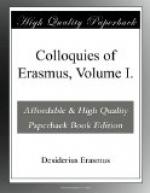Ti. But will you give us Leave now to discourse freely in your Dominions?
Eu. As freely as if you were at Home at your own Houses.
Ti. You don’t love vast Expences upon Churches, you say, and this House might have been built for less than it was.
Eu. Indeed, I think this House of mine to be within the Compass of cleanly and convenient, far from Luxury, or I am mistaken. Some that live by begging, have built with more State; and yet, these Gardens of Mine, such as they are, pay a Tribute to the Poor; and I daily lessen my Expence, and am the more frugal in Expence upon myself and Family, that I may contribute the more plentifully to them.
Ti. If all Men were of your Mind, it would be better than it is with a good many People who deserve better, that are now in extreme Want; and on the other Hand, many of those pamper’d Carcases would be brought down, who deserve to be taught Sobriety and Modesty by Penury.
Eu. It may be so: but shall I mend your mean Entertainment now, with the best Bit at last?
Ti. We have had more than enough of Delicacies already.
Eu. That which I am now about to give you, let your Bellies be never so full, won’t over-charge your Stomachs.
Ti. What is it?
Eu. The Book of the four Evangelists, that I may treat you with the best at last. Read, Boy, from the Place where you left off last.
Boy. No Man can serve two Masters; for either he will hate the one and love the other, or else he will hold to the one and despise the other: You cannot serve God and Mammon. Therefore, I say unto you, take no thought for your Life, what you shall eat, or what you shall drink: Nor yet for your Body, what you shall put on. Is not the Life more than Meat, and the Body than Raiment?
Eu. Give me the Book. In this Place Jesus Christ seems to me, to have said the same Thing twice: For instead of what he had said in the first Place, i.e. he will hate; he says immediately, he will despise. And for what he had said before, he will love, he by and by turns it, he will hold to. The Sense is the same, tho’ the Persons are chang’d.
Ti. I do not very well apprehend what you mean.
Eu. Let me, if you please, demonstrate it mathematically. In the first Part, put A for the one, and B for the other. In the latter Part, put B for one, and A for the other, inverting the Order; for either A will hate, and B will love, or B will hold to, and A will despise. Is it not plain now, that A is twice hated, and B twice beloved?
Ti. ’Tis very clear.
Eu. This Conjunction, or, especially repeated, has the Emphasis of a contrary, or at least, a different Meaning. Would it not be otherwise absurd to say, Either Peter shall overcome me, and I’ll yield; or I’ll yield, and Peter shall overcome me?




